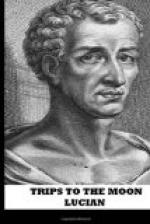What then is in the power of art or instruction to perform? not to create qualities and perfections already bestowed, but to teach the proper use of them; for as Iccus, Herodicus, Theon, {51} or any other famous wrestler, would not promise to make Antiochus a conqueror in the Olympic games, or equal to a Theagenes, or Polydamas; but only that where a man had natural abilities for this exercise he could, by his instruction, render him a greater proficient in it: far be it from me, also, to promise the invention of an art so difficult as this, nor do I say that I can make anybody an historian; but that I will point out to one of good understanding, and who has been in some measure used to writing, certain proper paths (if such they appear to him), which if any man shall tread in, he may with greater ease and despatch do what he ought to do, and attain the end which he is in pursuit of.
Neither can it be here asserted, be he ever so sensible or sagacious, that he doth not stand in need of assistance with regard to those things which he is ignorant of; otherwise he might play on the flute or any other instrument, who had never learned, and perform just as well; but without teaching, the hands will do nothing; whereas, if there be a master, we quickly learn, and are soon able to play by ourselves.
Give me a scholar, therefore, who is able to think and to write, to look with an eye of discernment into things, and to do business himself, if called upon, who hath both civil and military knowledge; one, moreover, who has been in camps, and has seen armies in the field and out of it; knows the use of arms, and machines, and warlike engines of every kind; can tell what the front, and what the horn is, how the ranks are to be disposed, how the horse is to be directed, and from whence to advance or to retreat; one, in short, who does not stay at home and trust to the reports of others: but, above all, let him be of a noble and liberal mind; let him neither fear nor hope for anything; otherwise he will only resemble those unjust judges who determine from partiality or prejudice, and give sentence for hire: but, whatever the man is, as such let him be described. The historian must not care for Philip, when he loses his eye by the arrow of Aster, {53a} at Olynthus, nor for Alexander, when he so cruelly killed Clytus at the banquet: Cleon must not terrify him, powerful as he was in the senate, and supreme at the tribunal, nor prevent his recording him as a furious and pernicious man; the whole city of Athens must not stop his relation of the Sicilian slaughter, the seizure of Demosthenes, {53b} the death of Nicias, their violent thirst, the water which they drank, and the death of so many of them whilst they were drinking it. He will imagine (which will certainly be the case) that no man in his senses will blame him for recording things exactly as they fell out. However some may have miscarried by imprudence, or others by ill fortune, he is only




